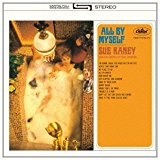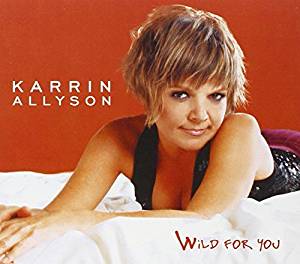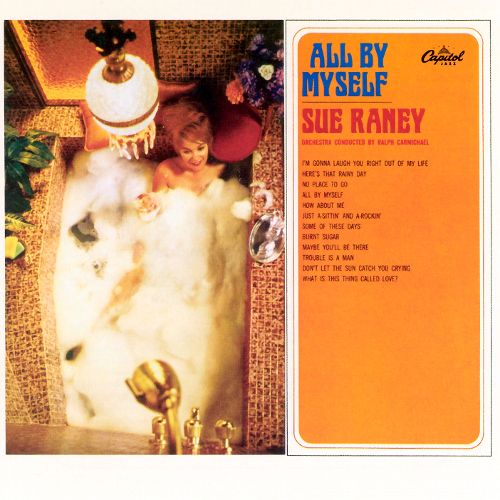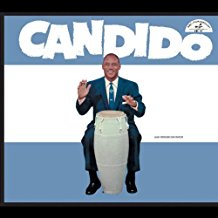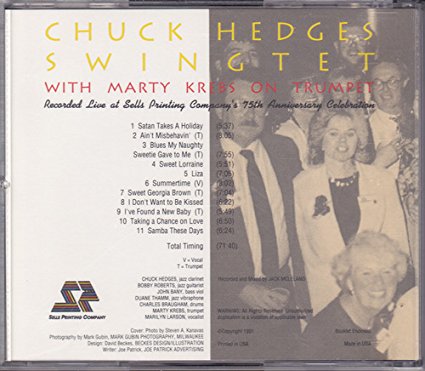-
Posts
13,205 -
Joined
-
Last visited
-
Donations
0.00 USD
Content Type
Profiles
Forums
Events
Blogs
Everything posted by Larry Kart
-

Karrin Allyson - Ballads (Remembering John Coltrane)
Larry Kart replied to mjzee's topic in Recommendations
There are no more supper clubs. -
Are these in any way legit/authorized (i.e. by the artists) releases? If not, forum rules say that bootlegs being offered for sale here is a no-go. Or is there something afoot here that means this forum rule does not apply?
-

Karrin Allyson - Ballads (Remembering John Coltrane)
Larry Kart replied to mjzee's topic in Recommendations
My Sue Raney is Sue Raney, too. I just meant what I said -- that the young Raney was depicted/marketed as something of a cute kitten (remember the album cover with her in a bathtub? -- see above) and that at times Allyson seems to have been handled in a similar manner (e.g, sprawled on a bed with her chest on display ---see below). OTOH, based on the fair bit I know of and have heard of Raney and the little I know and have heard of Allyson, I would guess that Raney, given the era she came up in and the eras she's passed through, found herself (as a woman and as a singer) to have been a good bit more at the mercy of the whims of the business and its image-making needs and desires than Allyson has been. In particular, Raney came up at time when it was mistakenly thought that a singer of her gifts, style, and looks could still make it BIG, maybe a la a latter-day Doris Day. Can't imagine that anyone thought of Allyson as being that kind of meal ticket. Diana Krall territory was the hope and plan for her, no? -- though I much prefer Allyson to Krall. P.S. I see that Krall and Allyson are about the same age, 52 and 53 respectively. Boy, does that make me feel old (though I'm two years younger than Sue Raney). -

Karrin Allyson - Ballads (Remembering John Coltrane)
Larry Kart replied to mjzee's topic in Recommendations
Listening for the first time to Allyson's "Wild for You." There's something personal and very musical at work there and on "Ballads" too, though the cute kitty photos of her snub-nosed self make me think a bit of the marketing and perhaps the reality of vintage Sue Raney. But then if you are kind of a cute kitty, at least to the eye... OTOH, I hear more than that in her singing. -
Don't think so, though James does sing "Don't Got To Strangers" here -- just because, she says, she used to be annoyed by requests for Jones' signature number on the part of people who confused the two Ettas. In the liner notes James says she's been moving into a jazz groove for some time, though she also says, citing Dinah Washington and others, that the line between r&b, gospel, and jazz can be amorphous. BTW, James tells a good Washington story in the notes: When the young James sang "Unforgettable" in a club because she knew Washington was present, the Queen swept all the glasses off her table and yelled to James, "Don't you dare sing my song when I'm in the house!" Dinah came backstage afterwards and repeated the threat, then, when she saw that James was in tears, relented some and asked James to come to the theater in town where she was performing.
-
Just picked up a copy of this 1995 album. Solid gold so far. The interaction between James, the rhythm section (Cedar Walton, John Clayton, Paul Humphrey) and tenor saxophonist Herman Riley on "Night and Day" is quite something:
-
Got it and it does sound quite good.
-
Also, I think Dave Bany was a replacement for Bob Roberts. For some reason, strange or not so strange, DeMicheal is a person whose physical and emotional reality (the way he looked, the way he spoke, his wit, etc.) I can conjure up almost instantly after all these years. I think it's the sound of his voice especially -- that slight, kind of sexy, confiding Louisville drawl.
-
Picked up his eponymous 1956 album, originally on ABC-Paramount, with Al Cohn, Joe Puma, Dick Katz, Whitey Mitchell, and Teddy Sommer. Al is in exceptionally vigorous, soulful form; it's as though Candido's presence brings out his inner Gene Ammons.
-
Don't know how to get that one. I ran across it at a library de-accessioning sale. Maybe through the printing company itself or through the company's then owner Marty Krebs, who sits in on trumpet? http://www.whitepages.com/business/sells-printing-co-llc-new-berlin-wi Apparently retired, Krebs lives (if he's still with us) in Florida. 920-854-2306, Sister Bay or Tampa, Florida Looking for Hedges on Amazon, I saw a good number of albums with him as a leader. As I said, "Just for Fun" on Arbors is nice, but some of the other albums I sampled and now have ordered seemed like they might be better. I ordered "Just for You" and "No Greater Love." We shall see.
-
Drewes is a longtime favorite of mine -- a highly individual offshoot of Warne Marsh and Lee Konitz, or so I think. He's on a lot of Steve LaSpina's albums for Steeplechase, always in fine form. He also inadvertently gave me the worst case of the respiratory flu I ever had. He was at the Elmhurst Jazz Festival about ten years ago in a big band led by Jim McNeely (might have been the Vanguard Orchestra -- Drewes is or was member), and afterwards Billy and I talked for a good while, even though he was sneezing and coughing something fierce. A few days later so was I -- sick as hell for almost two weeks.
-
I'm ashamed to say that I never paid much attention to clarinetist Hedges (he died in 2010 at age 77), even though he could be heard in Chicago quite often, usually with a Goodman-like small group, the Swingtet. A while ago Terry Martin -- a great clarinet maven -- mentioned that he was a Hedges admirer, and I picked up Hedges quartet album with Eddie Higgins et al. "Just for Fun" (Arbors), which was quite nice but also a bit same-y. Then the other day I ran across this private-label album (see below), with Hedges and the Swingtet, and there Hedges is just inspired. Yes, he's in a Swing or post-Swing bag, if that matters to you, but his fluency and sheer inventiveness place him wholly in the present -- a remarkable player. There's a good deal of Hedges on record, and I'll be listening to him now.
-
Humphrey sure is.
-
I'm sure that others here are way ahead of me, but I just ran across this excellent 1972 Verve album. Smith with guitarist Arthur Adams, bassist Wilton Felder, drummer Paul Humphrey, and congaist Buck Clarke in what might be called a fusion set because they just fuse together. Listen, for one, to Felder behind Smith toward the end of "After Hours."
-
Me too.
-
Thanks for the correction Mark. IIRC I had only two in-person encounters with Henderson. One was at the Jazz Showcase circa 1971 when it was at the North Park Hotel in Chicago, with the group he led with Curtis Fuller, Pete Yellin, George Cables, Stanley Clarke, and Lenny White -- a group that unfortunately only made half a record I believe. What a performance that was! The whole band was on fire, it was the best Fuller I've ever heard, and a reminder of what a loss it was when Clarke would soon travel to another musical realm. Then about a decade or more later I caught JH at the Showcase at the Blackstone, when he and Johnny Griffin were sharing the stand with JG's rhythm section (including Michael Weiss). Used to Joe's sound from recordings and also from that Chicago performance from a decade or so earlier with his own group, I was somewhat taken aback by the fact that JH was only about half as audible as JG -- and as one might expect JG showed Joe no mercy when it came to actual or implicit musical combat. Perhaps JH's drug use was a factor at the time.
-
Joe Henderson -- encountered on a George Wein-assembled European concert tour, with Jimmy Owens, Cedar Walton, Larry Ridley, and Roy Haynes -- is described by Burton as a bizzarely uncooperative all-around jerk with a nasty cocaine habit. "Things got weird at our first rehearsal. The schedule had us rehearsing the afternoon of the performance, so we could work out what songs we would play and who would solo on the various pieces. I expected we would each suggest a tune or two, maybe even have some lead sheets to pass out to the others. From the drop, Joe acted strangely. Most of us knew several of his compositions -- he'd written some great ones -- but Joe said he didn't want to play any of those. However, he didn't have any new music with him either. Whatever anyone suggested, Joe vetoed it. This went on for a long while, until about an hour before the gig, when it became obvious we were running out of time, and he grudgingly agreed to some of he choices. His behavior put everyone in a sour mood, and that didn't change much for the rest of the tour.... "Each night was a struggle with Joe. A couple of nights he didn't even show up; it turned out he had gone to some other city to line up a cocaine buy. For part of the tour he even had his drug dealer traveling with us...." Then there's the too long to quote tale of Joe and Jimmy Owens almost coming to blows during a concert when Joe saw that Jimmy was taping it with a cassette recorder, and another about the time Joe was subletting his New York apartment to a bassist Burton knew and demanded, as the bassist was in act of moving in, that he buy Joe's furniture for $10,000. "Before the tour," Burton continues, "I had considered Joe one of the greatest musicians of my generation, and I relished the opportunity to [play with him, maybe even get to know him. I knew that Joe had a reputation as something of a bad guy ... but I had looked forward to working with him. But not only did he act like a total prick during the tour; he didn't play that well either. I know that this kind of behavior, toward friends and fellow musicians, is commonplace among druggies. It all comes down to scrounging every dollar you need to feed the habit, and it brings out the worst behavior. But to this day, I can never listen to Joe's music without experiencing so many negative connotations that I have to turn it off."
-
Reading it now, am on p.195 of 356 pages. It's often enlightening and entertaining but also a bit creepy at times -- it's like there's a piece or two missing in Burton's emotional makeup. This comes through, for example, in the number of times Burton says something -- a la the remarks about Milt Jackson at NT State that Sangrey remembers -- that angers/alienates particular musicians and/or their admirers. In each of these instances, at least by Burton's accounts of what happened, he put something a bit awkwardly/was misunderstood, etc. and yet as these instances accumulate, one begins to wonder. A particular gem is what he said to Leonard Feather that led Miles to say to a clubowner who both he and Burton knew, "Tell [Burton] if he ever mentions my name again, I'll kill him!" -- a remark that Burton says he found "frightening." (Well, yes, but also, almost certainly, no -- speaking as someone who once was on the receiving end of some hostility from Miles. He did a lot of game playing.) In any case, Burton's account of what happened was that in 1968 he was being interviewed by Leonard Feather for the LA Times, and Leonard asked a number of questions about Burton's popular new quartet and the attendant "jazz-rock phenomenon." Burton: "I told him that as young musicians we were seeking out our own identity and went on to say that every trumpet player can't play like Miles and every tenor player like Coltrane -- an answer I considered pretty reasonable. "The next day the headline for the article read, 'Burton Claims Miles and Trane are Old Hat.' Mortally embarrassed, I called Leonard immediately to complain. He insisted that this was how he understood my meaning, and he refused to correct it." In any case, Miles was in LA at the time, saw the headline and Ka-Boom. Now Leonard's obtuse or worse journalistic behavior here, if Burton is to be believed about the details, comes as no great surprise to me. And yet, again, as such episodes accumulate in Burton's life -- I dunno. Gary literally has perfect pitch but in some respect he's kind of tone deaf. Another thing that struck me along somewhat related lines -- Burton's three-year tenure with Getz was in good measure a horror show, and every story Burton tells about Getz's typically outrageous conduct toward Burton, the other members of the group, and just about every human being he ran across, not to mention his frequent bouts of paranoia and exploitive and/or self-destructive behavior rings true. But why then -- and maybe I'm the one who's being obtuse here -- does Burton emphasize that he became so close to Getz and his family during this time that he thought of himself as another family member, evem more or less Stan's son? Yes, Stan was a vortex, but if Burton himself was, as he paints himself to be, so much the rational, take-care-of-business, take-care-of-bad boy Stan guy in the midst of this ongoing shit storm -- well, how rational could Burton in fact have been, even though he was in fact doing everything he said he did in attempt to lessen the damage/make things work? There's a piece or two missing here, I think.
-
Speaking of comping, y'all know how great Kenny sounds on this:
-
About Kenny Barron -- hmm. Maybe he won't back you up against a wall, but the sheer elegance of his playing? And he's also consistently inventive IMO, never formulaic, always thinking, pushing ahead. Actually, FWIW his brother's music may not have been the best setting for him; its highly patterned/highly personal harmonic frameworks, which of course were right for Bill's ear and approach, seemed to impose their will, so to speak, on Kenny's own ways of doing things. I like my son Jacob's very present-day modular synth pieces. Check 'em out:
-
Not sure what you mean by "going back." Music from the past rather than the present?
-
A good Bosch. Agree about Grace Kelly. Before that Bosch was pushing Frank Morgan, who often struck me as something of a con man both on and off the stand. My Frank Morgan story, which I think I've told before. He was at the Jazz Showcase when he made his comeback, playing with one of the usual high-level Chicago rhythm sections of the time, Willie Pickens, maybe Dan Shapera on bass, and Wilbur Campbell. After the first set Frank starts to berate the rhythm section for not playing some of the tunes properly, in terms of following certain routines, which was a bit bewildering because the set consisted of familiar jazz lines and standards which are played in much the same ay by virtually everyone, and the group, as usual for the venue when there was a visiting soloist, did not rehearse beforehand and thus could not be expected to handle them in special, Morgan-preferred ways, in case there were any such. Morgan was both irate and insulting, especially toward Campbell, which kind of stunned me a) because Wilbur was a great drummer and a great guy who played with everybody who came into the Showcase under just those conditions and b) because I could hear no particular glitches between Frank and the rhythm section during the set. Audible to all, this tirade went on for a while, much to Wilber's displeasure, until the normally mild-mannered Pickens intervened and told Frank to sit down and shut up, which he did. Don't recall if I then asked Willie what that was all about, but in any case he volunteered that he grew up with Frank in Milwaukee, and that this is what he always was like -- mostly, he thought, because Frank was so damn insecure about his own abilities.
-
Can't be. Gordon died in 1955, the film is from 1961. Wonder who it is, though. Pretty sure it's an actual musician, not an actor.
-
Very much. Got pretty much all the Barron there is on record, I think. Particularly like that old Audio-Fidelity album with Ted Curson.
_forumlogo.png.a607ef20a6e0c299ab2aa6443aa1f32e.png)

